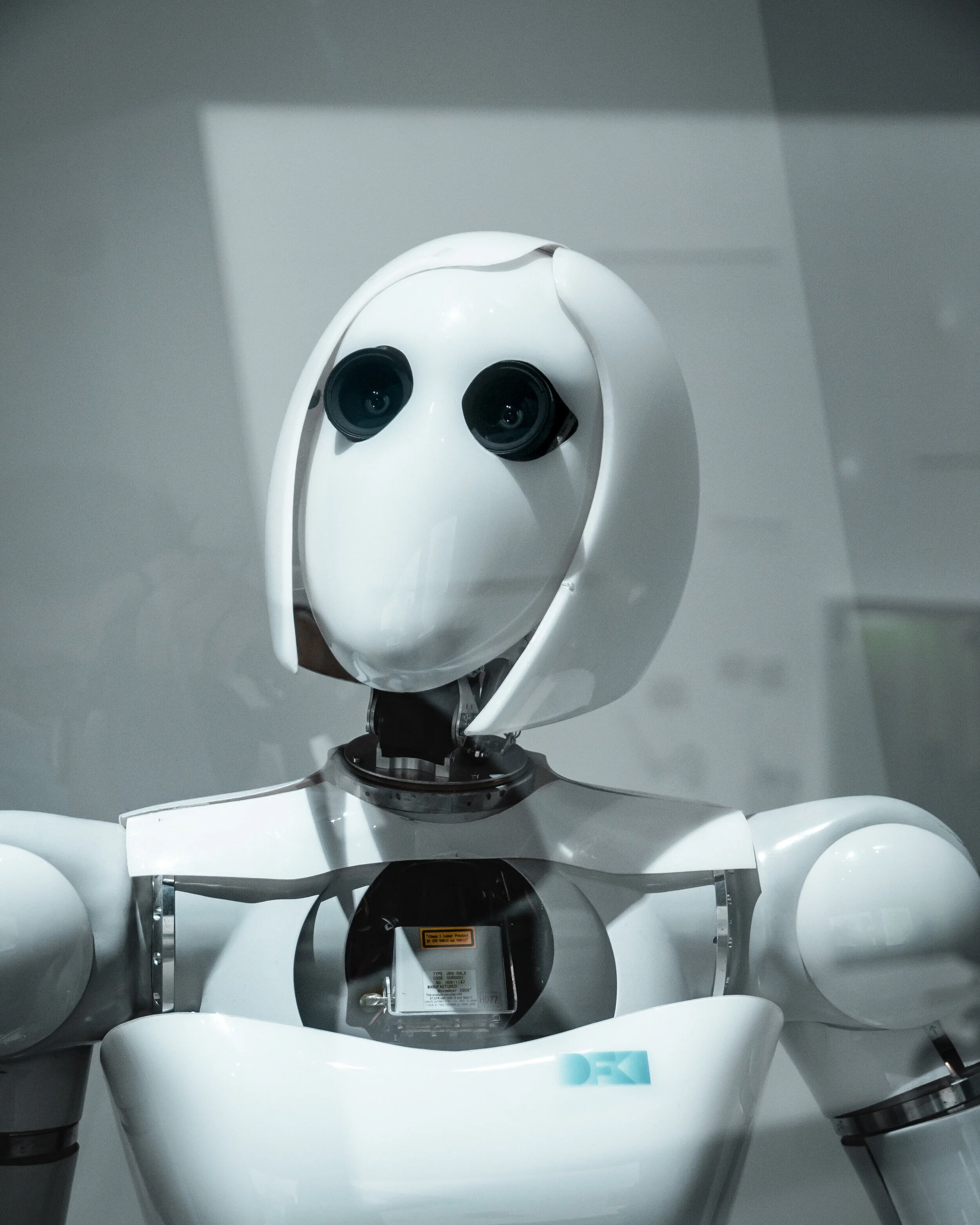A trip to the Uncanny Valley
Happy Hallowe’en! This month, I thought I’d do something different and tell you a SPOOKY TALE.
Once upon a time…
One year, you decide to go on holiday in the Swiss Alps. A bit of Googling and you’re booked at the beautiful Hôtel de la Vallée Étrange, not far from Lac de la Chair de Poule.
It’s dark when you arrive, and you fall into bed wearily. In the morning, you wake fully refreshed and determined to enjoy the glorious weather in these extremely unthreatening and not at all ominous mountains. After a leisurely breakfast of bat-shaped toast and spider-shaped pancakes, you set off, burping gently and wondering how the photos on the hotel website had managed to completely exclude the extensive graveyard that surrounds the property.
After a walking for a while, you pause and admire the view.
What an uncanny valley you’re in! Much of it is obscured by mist, and it’s mysteriously become dusk even though it’s not yet lunchtime, but you can just make out some letters on the rock by the small brook that bubbles away at your feet: MASAHITO MORI.
Strangely, MORI is beautifully etched into the stone, but MASAHITO has been inexpertly written in purple Sharpie over the top of another etched word that you cannot quite make out. Still, the accompanying skull-and-hourglass motif is pretty cool.
A voice booms from above, startling you.
“The uncanny valley isn’t a real place,” it says. “It’s an idea that the researcher Masahito Mori came up with to describe the eerie feeling that many people get on encountering something that is human-like but not a living human – zombies, some robots and human-like puppets like ventriloquists’ dolls.”
The voice takes on a pedantic tone, as though it spent ten years working as a lecturer and still hasn’t gotten over it. “Though, as Mori is Japanese, he used the example of bunraku puppets rather than ventriloquist puppets.”
The voice falls silent and you hear a loud rustling noise from a nearby clump of bushes, as though someone is jogging through dead leaves while also attempting to put on a guard’s uniform.
It is only at this point that you realise the voice was speaking English and not Swiss French, unlike everyone else you’ve met since arriving. You shrug, and walk up the path by the brook.
Three riddles!
Soon, you come to a gatehouse, next to which is a sweaty, panting guard leaning on her halberd and clutching her side. Beyond, you can see a castle.
“Greetings… mortal,” the guard says, her attempt to remind you of your own impermanence only slightly ruined by her wheezing. “Want to… hear… three… riddles?”
“Sure,” you say.
“Okay…” she gasps, fetching a crumpled scroll out of her jacket and unrolling it very, very slowly while she catches her breath.
“Number 1!” she finally says. “What is the difference between a mechanoid, a humanoid and an android?”
You’ve been studying robotics in your spare time, so you confidently answer, “A mechanoid is a robot which looks like a machine, a humanoid is a robot which has some human-like features, and an android is a robot which appears and behaves in ways that are as close to human as technology allows.”
“Yes indeed,” she replies. “Most uncanny valley research is done with robots, partly because it’s not very easy to find zombies and partly because more and more people are relying on robots for things like cleaning and medical care. There’s generally an increase in likeability or affinity or familiarity the more human something looks, which is why people tend to like humanoids more than mechanoids. However, as you get closer and closer to human, there’s a dip in likeability – that’s the uncanny valley itself – so people like androids less than humanoids.”
She unrolls the scroll a bit further. “Here’s number 2: how would you translate the Japanese word shinwa-kan into English?”
“It depends who you ask,” you say. “Some people would say likeability, some would say familiarity, and some would say affinity.”
“You’re right. This is a real problem in research on the uncanny valley, because Mori used shinwa-kan in his original writing and different people have translated it into English in three different ways, meaning three different ideas about what makes us feel spooked by human-like things. It might be more useful to locate that feeling within three dimensions: how warm we feel towards something or someone, how eerie we perceive it or them to be, and whether feeling cold and eerie is right or wrong for the context, because that’s fine in a haunted house but you don’t want to feel it in most situations.”
“Makes sense,” you say.
“And lastly,” she says, “here’s number 3! Does everyone experience the uncanny valley?”
This time you have to think for a bit. “Probably not,” you say. “Some people are more easily spooked than others.”
The guard high-fives you. “Good point! There are some personality characteristics that mean you’re more likely to think of androids as more eerie, less warm, or both, including anxiety, how easily you are reminded of your own mortality, and holding fundamentalist religious views, at least in the Abrahamic religions. Interestingly, it also matters what personality characteristics you attribute to the robot. Well, you can carry on into the castle,” she says, and disappears into the gatehouse. A loud shriek rends the air, followed by some muffled swearing about unoiled hinges that seems to be coming from under your feet.
You head for the front doors.
You raaaaang?
In the finest traditions of spooky old castles, the doors creak open before your finger touches the doorbell, but there doesn’t seem to be anyone doing the opening. Peering into the gloom beyond, you spot a complicated arrangement of strings leading from the door handle to a stationary bicycle, upon which a butler with luxuriant eyebrows is furiously pedalling. She’s so embarrassed when she spots you staring that her legs stop working, and the built-up momentum of the pedals hurls her over the handlebars. You just squeeze past the rapidly-closing doors before you’re shut out, hurry over to the stricken butler and help her to her feet. Her eyebrows are now at 90-degree angles to each other. You can see other, much smaller, eyebrows in the usual place on her forehead. They look vaguely familiar…
“The Mistress is… occupied,” she says sombrely, “but I am authorised to show you to the portrait hall.”
The portrait hall, it turns out, contains a long, long row of copies of the same small portrait of a humanoid. At least, that’s what you think at first.
As the butler leads you down the row you realise that the face is slowly changing, becoming more human. It’s pretty unsettling, though so are the butler’s eyebrows, which she still hasn’t realised are out of place.
You stop, and the butler says, “Yeeeeeeeessssss?” in a sepulchral creak with a lot of vocal fry.
“Why do I find it creepy that these portraits are morphing into a human?” you ask.
“I’m glad you asked!” she says, suddenly becoming a lot less funereal. “No-one’s really sure, but there are lots of theories. One is that it’s a mechanism to keep us away from fresh corpses – they’re often dangerous because they might mean a predator is nearby or that they had an infectious disease – and if you think about it, both androids and corpses look like but aren’t healthy, living humans. Interestingly, people find video game characters uncanny if they express emotions with the lower part of their face while the upper part doesn’t move, which might be because the unmoving part of the face looks like it’s in rigor mortis… though it could also be because it makes the emotion harder to read and therefore harder to respond to in an appropriate way.
“A second theory is that when we see a humanoid, we initially assume it’s a human or at least close to human, and as its mechanical characteristics become more obvious, we start to dehumanize it, thinking of it as having less self-control, intelligence, and emotional capability. This probably happens with humanoids but not other types of robots because we have a tendency to anthropomorphise the humanoids but not the other types.”
She starts walking again, and you follow her. The portraits continue to become more human, and after a while you notice that you’ve started to think of the subject as a person, not an object.
The butler continues, “Another theory is related to ideas about what it means to have a mind. Generally speaking, we think that something has a mind if it can have conscious experiences like pain and pleasure, and if it has agency, the ability to determine its own actions. Androids might be creepy to us because we think they have agency but not conscious experiences, so they have a mind in one way but not in another. That’s one kind of mismatch, but there’s also a theory about perceptual mismatch between different features of an android – for example, it could look human but not move in a human way – and the discomfort that we experience in those situations could also be an explanation for prejudices against people who use prosthetic limbs or synthetic voices.”
The butler stops in front of the final portrait: a handsome, good-humoured-looking witch.
“The last theory I’ll tell you about is category ambiguity,” she says. “The theory is that we like to create boundaries where there are none. In the case of the uncanny valley, the boundary we try to create is between human and not-human, and we find it strange when something or someone has features of both those, because we can’t easily place the object or person in a category. Though I don’t think anyone’s done any research on it, this theory could also tell us something about prejudice – in this case, prejudice about gender presentation. If you think of genders as categories rather than points on a continuum, non-binary people and others who don’t fit the societal expectations of gender probably make you feel uncomfortable because you can’t easily place them in your pre-determined categories.”
She sighs. “The thing is, this theory doesn’t necessarily hold up, because we don’t seem to create artificial boundaries on every kind of continuum. No-one really knows which theory is right, but—”
“EXCUSE ME,” the witch portrait booms, “YOU’VE FORGOTTEN ABOUT FREUD.”
You jump, and only just contain a scream. The butler is now fiddling with the portrait, muttering, “Hold on, hold on, the volume is too loud.”
The witch looks a little impatient, but waits until the butler nods.
“Freud believed that when we are anxious, it’s because we’ve repressed some other emotion. In the case of the uncanny, he thought that it was anxiety from repressed emotions about something that has been repeated many, many times. He didn’t write about androids because they didn’t exist in his day, but for him the uncanniness of an android would be because it was reminiscent of something famili—"
Confused by the talking portrait, you have been drawing closer and closer, and now, quite unconsciously, you have touched it. The butler’s earlier ministrations had, alas, loosened the frame, which falls on your foot. Fortunately, it isn’t heavy – in fact, it appears to be made of cardboard. Unfortunately, it is now clear that the portrait is rendered on a tablet, and the witch is looking very annoyed.
“I told you this was a silly idea, Clare!” she says, and her face disappears, replaced by a box that says How was your experience?
You click the thumbs up symbol and turn around. The butler has gone.
A nice cup of tea and a sit down
Once again you can hear muffled swearing. The noise seems to be coming from beyond a series of archways leading to a tunnel.
The tunnel is liberally festooned with cobwebs and very large spiders. As you approach, you realise they are not spiders but dried dates, each of which has eight tiny googly eyes and eight tiny matchstick legs.
Beyond the tunnel is – you cannot doubt it now – the same woman who was the guard, the butler and probably even the mysterious voice in the bushes. Eyebrows still askew, the guard helmet on her head, she is frantically digging in a box marked Discount Hallowe’en Costumes.
“AAAAAAHH!” she shrieks, when she notices you. A pair of plastic vampire fangs fly out of her mouth, narrowly missing you and embedding themselves in a date-spider. A small hailstorm of eyes and legs tinkles onto your head. “I mean… oh, to hell with it. Look, I really love Hallowe’en, and I really love science communication, and I tried to combine the two because I had this idea that The Uncanny Valley would be an amazing name for a ride at Alton Towers and I wanted to do a trial run to get some feedback so I rented this creepy old castle but I couldn’t convince anyone else to help me except Susannah and she said she could only do a Zoom call and—” she takes an enormous breath.
“Can I just tell you why you should care about the uncanny valley? I mean, researchers spending years going, ‘Hmm, yes, robots are a bit creepy,’ seems like exactly the kind of thing that would cause Michael Gove to say, ‘We’ve had enough of experts,’ but it’s important.”
You nod.
“Sit down,” she says. “I’ve got some tea here.”
You sit on one of the discarded Hallowe’en costumes as she takes out a Thermos.
“Aside from all the stuff I was saying earlier about this research providing surprising explanations for prejudice, it’s useful in and of itself.”
Her voice starts to slow, losing some of its animation.
“Fairly soon we’ll be able to mass-produce humanoids, and robots in general are starting to be used for things like assistive healthcare – you know, when someone has medical needs that mean they need a bit of help to carry on living in their own home.”
Her voice slows even more, and you notice that her hand seems to be unscrewing and rescrewing the Thermos lid in a jerky motion.
“If you’re someone relying on the help of a robot, the last thing you’d want is to find it spooky, and the research on the uncanny valley is really helpful because it can tell us about what might be unnerving in a robot and how that could vary from person to person.”
She finally gets the Thermos lid off, and starts to pour tea into it, then freezes, juddering and whirring slightly. The lid overflows, and the hand holding it falls off in a shower of sparks. You see silvery cables poking out of her wrist.
This time, you really do scream.
“Only kidding,” she says, and wiggles her real hand out of her sleeve, releasing a fistful of wires onto the floor. “I spent nearly all my budget on that trick. Good, eh?”





